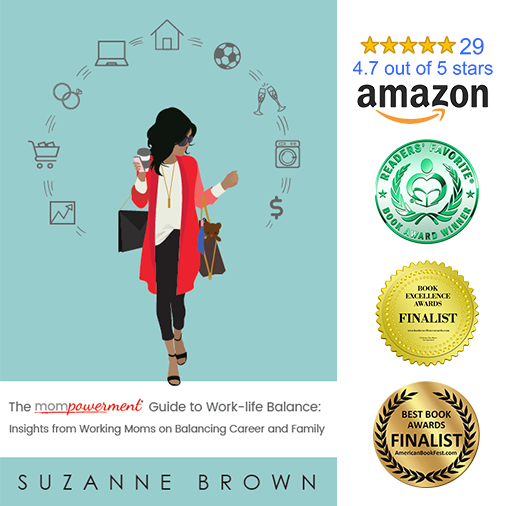 What happens when you are rockin and rollin in your career, but you start to realize that you want or need more work-life balance? It could be as simple you’re returning from maternity leave and don’t want to work full-time quite yet. Maybe your aging parents need more of your time and attention right now. It could be that your kids seem to need you more. Or maybe it’s that you want to spend more time with your children as they’re getting older and growing up before your eyes.
What happens when you are rockin and rollin in your career, but you start to realize that you want or need more work-life balance? It could be as simple you’re returning from maternity leave and don’t want to work full-time quite yet. Maybe your aging parents need more of your time and attention right now. It could be that your kids seem to need you more. Or maybe it’s that you want to spend more time with your children as they’re getting older and growing up before your eyes.
Whatever the reason for exploring different career models or approaches such as a professional part-time role, flexible role, split shift, or work from home, you’re not alone in wanting to change your career approach.
The research I did focused on professional part-time working moms; I interviewed more than 110 to hear their stories, insights, and advice. What I realized was that their advice and insights applied to so many situations where more work-life balance was wanted or needed, not only for a transition to a professional part-time role.
I dedicate a chapter to each of the following topics in the Mompowerment book (affiliate link), but this will give you a good idea of questions to consider as you move forward in exploring a change in your career model.
Understand your Motivation for a Change in Career Approach
Before you do anything else, you need to understand your motivation – your why – you want to change your career model. I heard about this need to understand motivation over and over in the interviews I did for the Mompowerment book (affiliate link). You must understand the driving force behind wanting the change and that will help you figure out what is the right career model for your needs. It will also act as your compass or blueprint for decisions moving forward.
It’s not as simple as asking why once and that’s it. You need to do some social searching and ask why a few times.
So, for example, you realize you want to spend more time with your children’s during after school activities. That seems pretty straightforward. The reason for that is that you have a passion for the activity and want to get more involved as a volunteer, which will only reinforce their interest. Knowing this, you likely have a few options for career approaches.
What Happens When You Change Your Career Model?
Now that you’ve thought through your motivation for wanting to change your career approach, start looking at the impact on you and your family. The transition will likely affect you personally and professionally. Make sure that those changes are reasonable and that you’re prepared for any changes you must make. It’s time to ask the tough questions about the short-term and long-term and better understand what adjustments you might need to make. And don’t forget to take time to brainstorm solutions to challenges that you’re facing.
Career Implications
When I talk about my book, I’m often if making a transition in career approach: “Will this transition hurt me professionally?” While I can’t answer that, I can share some questions to help you think through answer to that question. The implications of this transition are unique for everyone since each set of circumstances is a bit or a lot different.
Although there are many questions that I include in my book, I’m sharing a sample of strategic questions to start you down the path of understanding the career implications. As you review your answers, you’ll get a better idea of if this transition has acceptable repercussions in your situation.
- Are you a valuable employee to your manager and/or the company? Will the transition to a different career approach make you less valuable?
- Is shifting to a new career approach a short-term or long-term option? Does one or the other work better for you or are they equal? Why?
- If you miss an opportunity for career growth or promotion, how will that impact your own perspective on your career and family?
- Consider how you feel toward your job, manager, and the company you work for. Instead of a new career approach (or in addition to a new career approach), is it time to consider a new employer? Is this a time to make a major shift to a new career or even start your own thing?
Personal Implications
I am also often asked about: “What changes will I have to make in my personal life [when I change my career approach]?” If you shift from one career approach to another, there are usually changes for you and/or your family. These questions can help you think through this side of the equation.
- Will giving more time help your family at this point or in an upcoming season of life? What makes you think that?
- What kinds of conversations have you had with your significant other? How has your idea been received? What concerns have come up for either one of you?
- What will your new schedule be? How will it impact your family?
- What changes will you need to make in your support structure (e.g., sitter, housekeeper, etc.)?
- How do you and your family feel about these potential changes? What can you do to address any concerns your family (not only your significant other) may have?
These questions won’t give you all the answers you need. They will start you down the path to understanding if this transition is right for you at this time. The questions also help you get started on developing a plan for you and your family and for your team and manager.
The Financial Side of Changing Your Career Approach
I often get questions about the financial side of the equation. The question you must address is whether you can afford a pay cut. I say “if” and not “when” because some of the moms I interviewed didn’t get a pay cut because they understood their value and contribution to the company and negotiated their salary when they transitioned to a part-time schedule. Essentially, they were working part-time for about the same pay as a full-time employee. If you’re talking about a change in how your week looks which still encompasses the same number of hours (e.g., flexible or work from home), then the financial side of things isn’t as relevant.
If you’re looking to reduce your house and do get a pay cut, these questions might help. They aren’t all-encompassing and shouldn’t take the place of contacting a financial professional if you want to understand, without a doubt, your own unique situation.
I include questions about retirement because there could be long-term implications to working part time, even for a short time. Questions about benefits are also included below because benefits can make up a substantial part of compensation. According to the most recent US Bureau of Labor Statistics Employer Costs for Employee Compensation Summary, benefits make up thirty to almost thirty-seven percent of an employee’s compensation, depending on the type of employer.
- What personal costs must be covered with your income? This could include things like mortgage, energy bills, activities for kids, vacation, housekeeping services, and money that goes to retirement accounts, to name a few.
- What lifestyle changes, if any, will you and your family need to make if your income level drops?
- How will your retirement plan be impacted by a drop in your income?
- If you have insurance through work, will a reduction in hours (e.g., a part-time schedule) affect that coverage? There are some legal aspects to this, but what is your company’s policy on minimum number of hours at which you maintain your benefits?
- If you lose benefits, what does the benefits package look like through your significant other? Or what does coverage look like if you don’t have benefits through your significant other? There have been recent changes to insurance, so make sure to understand this area and ask a professional if you aren’t sure.
- If you have vacation or sick days accrued, how will a transition to part-time status affect that time? If there is a negative impact, how can you negotiate to overcome the challenge?
- If you plan on getting pregnant again, how does a part-time status affect maternity leave? Again, there is a legal aspect to this, but understand your company’s policy on this.
Take Your Time
You might be chomping at the bit to make changes immediately and circumstances might require that. Mine certainly did. Our older son was born 10 weeks premature after a normal pregnancy. We didn’t know what life after the NICU would hold for us. We didn’t end up necessarily needing me at home and could have hired a full-time nanny, but that wasn’t what we wanted. I was able to have a strategic discussion with my manager because I had strategically planted seeds about a part-time role as a long-term solution even before leaving on maternity leave.
In normal circumstances, though, I highly recommend you take your time when you want to change your career model. Understand how making changes really will impact your situation. Talk to your family. Address any questions. Brainstorm solutions. Let things sit with you before moving to the next step.
Importance of Networking When You Change Your Career Model
You are ready to make things happen, so now what? If it’s a case of talking to your manager or senior leadership, you might think next steps are simple. Even in that scenario, you might want input from others who have made changes before you. They can help you understand about what to submit to your manager or senior leadership such as a proposal (this was recommended by many of the women I interviewed and I dedicate a whole chapter to it in the Mompowerment book (affiliate link)).
Or you might realize that looking for a change in work-life balance might require a whole new role, inside or outside of your current employer. You might also realize that it’s time to start your own business.
The #1 tip I heard in interviews with professional part-time working moms for the book was to network. That made a difference at an existing employer, when looking for a new role at a new company, and when building business as an entrepreneur. Start talking to people about what you’re looking for and that can help you get to your goals faster and with less effort.
****************************************
If you’re looking at a new career approach such as a professional part-time role or work from home, what types of decisions have you considered? What kinds of conversations are your having as you consider this change?
If you recently make this change, what types of questions did you ask and answer for your situation? What analysis did you do beforehand? Did something specifically help you understand how this change might impact your career or family situation?
If you want to go into more depth about the topics here, you can find Mompowerment: Insights from Successful Professional Part-time Working Moms Who Balance Career and Family on Amazon (affiliate links). You can also download two free chapters as a sneak peek of the Mompowerment book.


